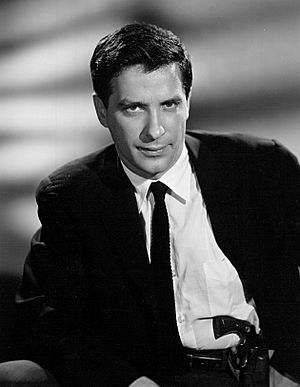John Cassavetes facts for kids
Quick facts for kids
John Cassavetes
|
|
|---|---|

Cassavetes as Johnny Staccato (1959)
|
|
| Born |
John Nicholas Cassavetes
December 9, 1929 New York City, U.S.
|
| Died | February 3, 1989 (aged 59) Los Angeles, California, U.S.
|
| Resting place | Westwood Village Memorial Park Cemetery |
| Alma mater | American Academy of Dramatic Arts |
| Occupation |
|
| Years active | 1951–1989 |
| Spouse(s) | |
| Children | |
| Parent(s) | Katherine Cassavetes |
| Signature | |
 |
|
John Nicholas Cassavetes (pronounced KASS-ə-VET-eez; December 9, 1929 – February 3, 1989) was an American actor and filmmaker. He is famous for making movies that were different from typical Hollywood films. He often used his own money to create his films. Many people see him as a very important director in the last 50 years.
Contents
Early Life and Learning
John Cassavetes was born in New York City. His mother, Katherine Cassavetes, was an actress. His father, Nicholas John Cassavetes, was from Greece. John spent his first few years in Greece. When he came back to the U.S. at age seven, he did not speak English. He grew up on Long Island, New York.
He went to Port Washington High School. There, he was active in the school paper, plays, and football. After high school, he went to Blair Academy in New Jersey. He also attended Champlain College but was asked to leave because of his grades.
Later, he joined the American Academy of Dramatic Arts. Friends told him it was a great place to meet people. He graduated in 1950. In 1953, he met his future wife, Gena Rowlands, at the Academy. They got married just four months later in 1954. John continued to act in plays and took small parts in movies and TV shows.
A Career in Film
John Cassavetes started his career as an actor in TV and movies. But he soon became a leader in making independent films in America. Independent films are made outside the big Hollywood studios. He often used his own money to pay for his movies. He even helped to share them with audiences.
Cassavetes acted in many well-known Hollywood films. These include Edge of the City (1957), The Dirty Dozen (1967), and Rosemary's Baby (1968).
Directing His Own Movies
John Cassavetes began directing films in 1959 with Shadows. He then directed other movies that were praised by critics. These include Faces (1968), Husbands (1970), and A Woman Under the Influence (1974). He also directed Opening Night (1977) and Gloria (1980). While directing, he still acted in some studio films and his own movies.
His Unique Filmmaking Style
Cassavetes's films focused on real human relationships. He showed "small feelings" that Hollywood movies often ignored. He liked to explore characters and their feelings rather than just a simple story. He often worked with the same group of actors and crew. This group included his wife, Gena Rowlands, and friends like Peter Falk. Many of his films were even shot and edited in his own home.
John Cassavetes believed in letting actors be free. He wanted them to experiment with their roles. He did not want them to just follow typical acting rules. While his films felt natural, they were usually carefully planned. He would often rewrite scripts based on how actors performed during practice. He said he believed in "improvising on the basis of the written word."
Cassavetes often had to use his own money to make his films. He even mortgaged his house to pay for A Woman Under the Influence. He did this to avoid getting money from people who might want to change his movie. He wanted to make films about human behavior, which Hollywood was not always interested in.
Music in His Films
John Cassavetes loved all kinds of music, from jazz to rock. He believed music made you feel alive. He worked with a musician named Bo Harwood on many of his films. Harwood composed music and helped with sound. Cassavetes sometimes preferred the first, rough versions of Harwood's music. This gave his films a raw, natural feel.
Awards and Recognition
John Cassavetes received many awards and nominations for his work.
- He was nominated for an Academy Award for Best Supporting Actor for his role in The Dirty Dozen.
- As a director, he was nominated for an Academy Award for Best Original Screenplay for Faces.
- He was also nominated for an Academy Award for Best Director for A Woman Under the Influence.
- The Independent Spirit Awards created the Independent Spirit John Cassavetes Award in his honor. This award celebrates filmmakers who make movies for less than $500,000.
Movies He Directed
Here are some of the movies John Cassavetes directed:
| Year | Title | Distributor |
|---|---|---|
| 1959 | Shadows | British Lion Films |
| 1961 | Too Late Blues | Paramount Pictures |
| 1963 | A Child Is Waiting | United Artists |
| 1968 | Faces | Continental Distributing |
| 1970 | Husbands | Columbia Pictures |
| 1971 | Minnie and Moskowitz | Universal Pictures |
| 1974 | A Woman Under the Influence | Faces Distribution |
| 1976 | The Killing of a Chinese Bookie | |
| 1977 | Opening Night | |
| 1980 | Gloria | Columbia Pictures |
| 1984 | Love Streams | Cannon Films |
| 1986 | Big Trouble | Columbia Pictures |
Images for kids
-
Cassavetes with his wife, actress Gena Rowlands, in 1959
-
Cassavetes and Mia Farrow in Rosemary's Baby (1968)
See also
 In Spanish: John Cassavetes para niños
In Spanish: John Cassavetes para niños






